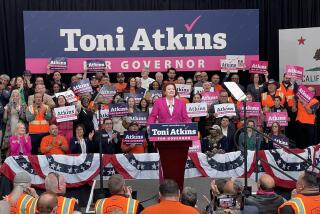Opinion: California’s Senate vacancy: There’s more to it than just wanting the seat
We had a little public do-si-do this week over whether California Atty. Gen. Kamala D. Harris or Lt. Gov. Gavin Newsom, both Democrats, would run to succeed Sen. Barbara Boxer, who announced last week that she would not run for reelection next year.
Naturally we reporters wanted a vigorous, quotable tussle, but we quickly learned that Harris is going for it and Newsom is not -- maybe to keep his powder dry to succeed Gov. Jerry Brown.
How did that happen? Newsom told the Times that it’s “nonsense” to suggest there was a backroom deal to divvy up the jobs between the two, but someone must have played Solomon to avoid the political carnage of a top-two-finishers general election pitting one Bay Area Democrat against another.
What you didn’t hear much talk about was the nature of the jobs themselves and how suited these people are to filling them.
Of course one job is legislative, the other executive. A senator has a national profile, and a 1% vote in what calls itself “the greatest deliberative body in the world.” A governor -- often unknown beyond state borders -- sets budgets for and operates (in California’s case) the seventh- or eighth-largest economy in the world.
These are not interchangeable gigs, in temperament nor in some skills. A candidate for governor may be completely unsuited to the Senate, and vice versa. A senator can afford to be an outlier, a firebrand, part of a faction; the late Minnesota Democrat Paul Wellstone liked to say that he represented “the Democratic wing of the Democratic Party.” GOP senators run the ideological gamut from Ted Cruz to Susan Collins. But a governor has to be the nominal leader of a state party, as well as a whole state.
Imagine former California Gov. George Deukmejian in the Senate, or Sen. Rand Paul as Kentucky’s governor. A few people have played both legislative and executive roles; President Obama was a senator, as was California Gov. Pete Wilson.
For me, the most memorable moment of Wilson’s Senate career was when he showed up on the Senate floor in 1985 in a wheelchair, wearing his jammies, barely two days after having his appendix out, to cast a budget vote. His most memorable moment as governor was probably his forthright support of the anti-immigrant Proposition 187, which tied a millstone around the GOP’s neck that it still hasn’t been able to remove. Which job will historians find he was better suited to?
The only election Jerry Brown ever lost was the Senate race to Wilson in 1982. How different might California, and the U.S. Senate, have been if Brown had won?
The field for California’s junior Senate seat has yet to jell but when it does, voters will have to play matchmaker: Who has the temperament and talent for which job? That’s what was missing from the Harris-or-Newsom chatter, which made the outcome feel about as random as a coin toss -- not the way California’s biggest political jobs should be filled.
Follow Patt Morrison on Twitter @pattmlatimes
More to Read
A cure for the common opinion
Get thought-provoking perspectives with our weekly newsletter.
You may occasionally receive promotional content from the Los Angeles Times.







